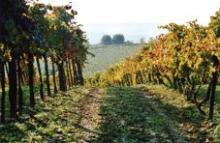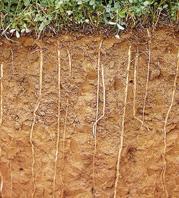cultivated soil
The earth is our basis for living - our planet "earth", and especially the "earth" below our feet - the soil.
Outside the waters, all life depends on the soil. The various types of soil offer a footing for the plants and feed them with water and nutriments. Thereby, they create, together with the climate, the preconditions that plants are able to transform by means of sunlight the carbon dioxide of the air into biomass. This process enables the growth of plants, and it safeguards the basis of alimentation for man and animals.
The soil is important in its ecological regulating function:
The soil is a filtre, buffer and transformator of a variety of substances. Substances incorporated in the various types of soil are bound to surfaces of clay minerals and oxides by means of chemical reactions. Organic pollutants are decomposed in the course of time by organisms living in the soil. Thus the contamination of ground water by pollutants can be prevented. The filtre and buffer capacity of the various types of soil is limited and differs according to the qualities of the soil. On account of its storage function for traces of gases relevant to the climate, and as one of the most important storage places for carbon of our planet, the soil contributes considerably to climate protection.
In order for our soils to fulfil all these functions, they need careful treatment. Within the meaning of sustainability, soil production means to now create the possibilities for the coming generations to further on use the soil carefully. In the economic cycle the soil plays an important role: Each and every one and especially users of gardens can make their contribution to soil protection. In the own garden this means to compost substances. The nutriments, which we withdraw from the garden, have to be returned in an adquate manner. Tips for composting are given by "die umweltberatung" in various training sessions.
In the province of Lower Austria, composting has been used for quite some time. Within the meaning of waste reduction, the main emphasis is given to a decentralized use of loppings and biological waste. In the end of the 90ies and in the first years of our millennium, respectively, the amount of remaining waste has been reduced, mainly on account of a separate collection and utilization of biogenous waste. The utilization of this type of waste is one component within the comprehensive protection of soil.
The organic substance plays a leading role in maintaining the most essential functions of the soil, and it determines the erosion resistance and fertility of the soil.
It safeguards the binding and buffer capacity of the soil, and thus contributes to the limitation of diffuse contaminations of water by the soil.A further contribution to soil protection in one's own area is linked to the question of fixation; there are various different possiblities, how to fix the ground, which are not connected with sealing. Each square metre with concrete or asphalt coating is lost for the ecological cycle.
Often a water-resistant coating, a gravel path or paving on sand are sufficient to use the garden according to one's own needs.
To cultivate the soil means to use it in a sustainable manner.
04.11.2025
EUSDR PA10: 12th Danube Participation Day in Sarajevo
more ...30.10.2025
Online-Präsentation BBK-Projekt CNSoil - Zwischenergebnisse
more ...07.10.2025
CatchHedge - Potenziale von Hecken im Zeichen des Klimawandels
more ...16.+17.09.2025
32nd Conference of the Danube Region
more ...12.09.2025
Grundlagen der professionellen Bio-Mandel-Produktion
more ...10.09.2025
Agroforst u. Marktgärtnerei, Symbiose
more ...05.09.2025
Regionales Wiesensaatgut gewinnen mit dem Wiesensamenernter
more ...25.06.2025
Feldtag - StripTill im Bio-Mais im Trockengebiet
more ...25.06.2025
Seminar: Wildbienen- und Nützlingsförderung im Biolandbau
more ...24.06.2025
BOKU Green Plate Forum 3.0
more ...24.06.2025
Die Maulbeere - Kultur, Produktion u.Verwendung
more ...17.06.2025
Frühjahrstagung Österr. Gesellschaft für Agrar- und Umweltrecht (ÖGAUR)
more ...13.06.2025
Seminar: Artenvielfalt in Ackerbauregionen fördern
more ...03.06.2025
Seminar: Keine Angst vor der Ackerdistel
more ...03.06.2025
Agroforstsysteme: Anbau-Modelle der Zukunft
more ...20.05.2025
IDM-Generalversammlung 2025
more ...15.05.2025
Seminar: Unkräuter/Beikräuter erkennen und als Zeigerpflanzen nutzen
more ...13.+14.05.2025
Bodenforum Österreich - Frühjahrstreffen
more ...04.05.2025
Tageskurs: Perma-Veggies - Mehrjähriges Gemüse und essbare Stauden
more ...03.05.2025
Waldgärten-Exkursion
more ...




